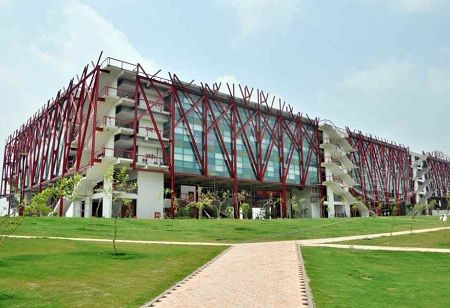
Jindal India Institute Trains Foreign Diplomats on India's Foreign Policy

 The Jindal India Institute (JII) of O.P. Jindal Global University (JGU) has successfully conducted the third edition of its one-day certificate course on "Understanding India's Foreign and Security Policy". This year, the program welcomed 31 participants, including foreign diplomats, correspondents, and defense attaches from 20 countries, embassies, and international organizations, all eager to deepen their knowledge of India’s strategic landscape.
The Jindal India Institute (JII) of O.P. Jindal Global University (JGU) has successfully conducted the third edition of its one-day certificate course on "Understanding India's Foreign and Security Policy". This year, the program welcomed 31 participants, including foreign diplomats, correspondents, and defense attaches from 20 countries, embassies, and international organizations, all eager to deepen their knowledge of India’s strategic landscape.
Among the countries represented were Australia, Brazil, Canada, members of the European Union, Finland, Kenya, Lithuania, Norway, and many others, including the United States, the United Kingdom, and South Africa. Esteemed institutions such as the International Committee of the Red Cross (ICRC) also participated, marking the diverse global engagement in this significant learning event.
The day-long training consisted of six comprehensive modules led by expert practitioners and academicians well-versed in international relations and defense matters. These sessions aimed to provide participants with a nuanced understanding of India’s foreign policy objectives and security strategies amid an increasingly complex international landscape.
The program commenced with a robust overview from Sreeram Chaulia, Professor and Director General of JII. He introduced the essentials of India's foreign policy, illustrating how India's strategies are shaped by its rich historical and cultural heritage, ranging from Kautilya's realpolitik to the idealism reflected in the Upanishads. Chaulia emphasized the core concepts driving India's international relations, such as strategic autonomy, non-alignment, and multi-alignment, while showcasing India's efforts to leverage foreign engagements to enhance its stature as a leading global power.
The first half of the day also included a detailed session on the organizational structure and functioning of India's Ministry of External Affairs (MEA). Ambassador Sanjay Bhattacharya, a Professor of Diplomatic Practice at the Jindal School of International Affairs, combined theoretical frameworks with practical insights to address participants’ queries about the MEA's roles and responsibilities.
Following this, Hindol Sengupta, Professor and Director of JII, delivered a thought-provoking address on India’s evolving worldview, which has significantly influenced its foreign policy since independence. He highlighted the various approaches undertaken by different Prime Ministers, from Jawaharlal Nehru to Narendra Modi, and underscored the success of major foreign initiatives led by each leader.
Ambassador Mohan Kumar, a Professor and Senior Fellow at JII, further elaborated on India's economic diplomacy, focusing on trade negotiations, investment strategies, and participation in multilateral forums. He pointed out the strong regional components in India’s connectivity projects, illustrating how these initiatives bolster its economic relationships with neighboring countries. One diplomat in attendance remarked, “India is the future. Africa sees India as the hope for a better world order”, indicating the global anticipation surrounding India’s growing influence.
The second half of the course pivoted to India’s security architecture. Swasti Rao, an Associate Fellow at the Manohar Parrikar Institute for Defence Studies and Analyses, discussed India’s defense partnerships with Western powers, detailing key agreements, collaborative technological advancements, and joint military exercises with Europe and the United States. Her insightful analysis of strategic motivations enriched the participants' understanding of India's evolving defense diplomacy.
Pooja Bhatt, Associate Professor at the Jindal School of International Affairs, took the stage next to cover India’s emerging role in the Indo-Pacific. Utilizing an array of maps, satellite imagery, and flowcharts, she presented a detailed examination of India’s strategic priorities, focusing on regional connectivity, maritime security, and economic cooperation.
The day concluded with a dynamic address by Air Marshal Anil Chopra (Retd.), a veteran of the Indian Air Force, who spoke about the military's essential contributions to national security. He highlighted the guiding ethos and doctrines that prepare India’s armed forces to address its primary external challenges.
C. Raj Kumar, the President of JII and Vice Chancellor of JGU, emphasized the importance of such initiatives in fostering a deeper understanding between India and the international community. He remarked, "As India takes on a more prominent role in global affairs, initiatives like this certificate course can foster deeper understanding between India and the international community". Raj Kumar added that the Jindal India Institute aims to deliver comprehensive expert-led training programs to enhance international awareness of India’s remarkable achievements and potential. "Our mission is to enhance India’s leadership role in the world through thought-provoking and educative courses, which can open the eyes of the international community and win more friends for India globally", he stated.